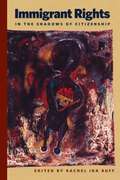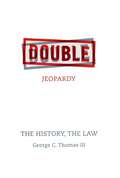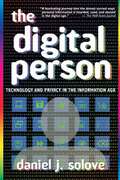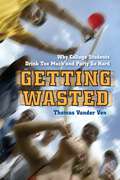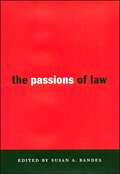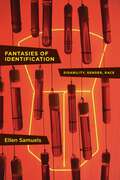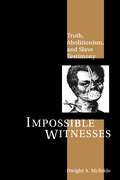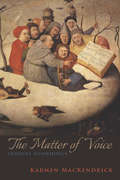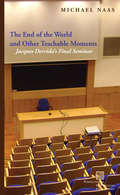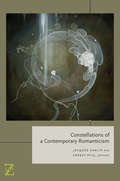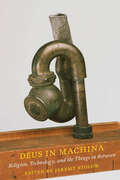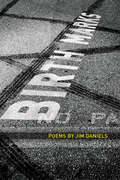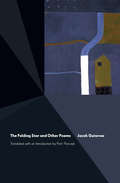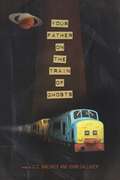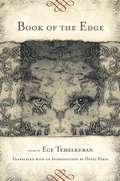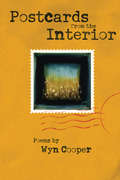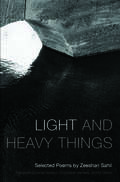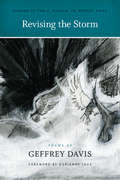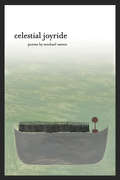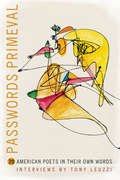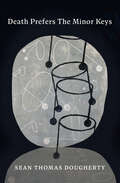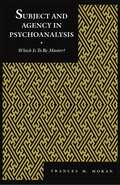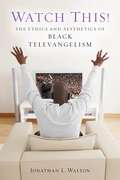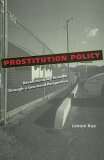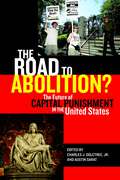- Table View
- List View
Immigrant Rights in the Shadows of Citizenship (Nation of Nations #15)
by Rachel Ida BuffPunctuated by marches across the United States in the spring of 2006, immigrant rights has reemerged as a significant and highly visible political issue. Immigrant Rights in the Shadows of U.S. Citizenship brings prominent activists and scholars together to examine the emergence and significance of the contemporary immigrant rights movement. Contributors place the contemporary immigrant rights movement in historical and comparative contexts by looking at the ways immigrants and their allies have staked claims to rights in the past, and by examining movements based in different communities around the United States. Scholars explain the evolution of immigration policy, and analyze current conflicts around issues of immigrant rights; activists engaged in the current movement document the ways in which coalitions have been built among immigrants from different nations, and between immigrant and native born peoples. The essays examine the ways in which questions of immigrant rights engage broader issues of identity, including gender, race, and sexuality.
Double Jeopardy: The History, The Law
by George C. Thomas, IIIIn the first book-length book on the subject in over a quarter century, George C. Thomas III advances an integrated theory of double jeopardy law, a theory anchored in historical, doctrinal, and philosophical method. Despite popular belief, double jeopardy has never been a limitation on the legislature. It functions instead to keep prosecutors and judges from imposing more than one criminal judgment for the same offense. Determining when seemingly different offenses constitute the "same offense" is no easy task. Nor is it always easy to determine when a defendant has suffered more than one criminal judgment. Tracing American double jeopardy doctrine back to twelfth century English law, the book develops a jurisprudential account of double jeopardy that recognizes the central role of the legislature in creating criminal law blameworthiness.
The Digital Person: Technology and Privacy in the Information Age (Ex Machina: Law, Technology, and Society #1)
by Daniel J SoloveA startling account of personal data dossiers and the newest grave threat to privacySeven days a week, twenty-four hours a day, electronic databases are compiling information about you. As you surf the Internet, an unprecedented amount of your personal information is being recorded and preserved forever in the digital minds of computers. For each individual, these databases create a profile of activities, interests, and preferences used to investigate backgrounds, check credit, market products, and make a wide variety of decisions affecting our lives. The creation and use of these databases—which Daniel J. Solove calls “digital dossiers”—has thus far gone largely unchecked. In this startling account of new technologies for gathering and using personal data, Solove explains why digital dossiers pose a grave threat to our privacy.The Digital Person sets forth a new understanding of what privacy is, one that is appropriate for the new challenges of the Information Age. Solove recommends how the law can be reformed to simultaneously protect our privacy and allow us to enjoy the benefits of our increasingly digital world.This is the first volume in the series EX MACHINA: LAW, TECHNOLOGY, AND SOCIETY.
Getting Wasted: Why College Students Drink Too Much and Party So Hard
by Thomas Vander VenA unique answer to the perennial question--why do college students drink so much?Most American college campuses are home to a vibrant drinking scene where students frequently get wasted, train-wrecked, obliterated, hammered, destroyed, and decimated. The terms that university students most commonly use to describe severe alcohol intoxication share a common theme: destruction, and even after repeated embarrassing, physically unpleasant, and even violent drinking episodes, students continue to go out drinking together. In Getting Wasted, Thomas Vander Ven provides a unique answer to the perennial question of why college students drink.Vander Ven argues that college students rely on “drunk support:” contrary to most accounts of alcohol abuse as being a solitary problem of one person drinking to excess, the college drinking scene is very much a social one where students support one another through nights of drinking games, rituals and rites of passage. Drawing on over 400 student accounts, 25 intensive interviews, and one hundred hours of field research, Vander Ven sheds light on the extremely social nature of college drinking. Giving voice to college drinkers as they speak in graphic and revealing terms about the complexity of the drinking scene, Vander Ven argues that college students continue to drink heavily, even after experiencing repeated bad experiences, because of the social support that they give to one another and due to the creative ways in which they reframe and recast violent, embarrassing, and regretful drunken behaviors. Provocatively, Getting Wasted shows that college itself, closed and seemingly secure, encourages these drinking patterns and is one more example of the dark side of campus life.
The Passions of Law (Critical America #67)
by Susan BandesThe Passions of Law is the first anthology to treat the role that emotions play, don't play, and ought to play in the practice and conception of law and justice. Lying at the intersection of law, psychology, and philosophy, this emergent field of law scholarship raises some of the most profound and interesting questions at the heart of jurisprudence. For example, what role do emotions ranging from disgust to compassion play in the decision-making processes of judges, lawyers, juries, and clients? What emotions belong in which legal contexts? Is there a hierarchy of emotions, and, if so, through what sources do we identify it? To what extent are emotions subject to change or tutelage? How can we evaluate the role of emotion in such disparate contexts as death sentencing, laws about same sex marriage, hate crime legislation, punitive damages or shaming penalties? Consisting of original essays by leading scholars of law, theology, political science, and philosophy, The Passions of Law contributes to ongoing efforts to humanize law and reveals how this previously unacknowledged aspect of decision-making exerts a much greater impact on justice and the practice of law than most tend, or like, to think. Learn more about Susan Bandes
Fantasies of Identification: Disability, Gender, Race (Cultural Front #10)
by Ellen SamuelsExplores the roots of modern understandings of bodily identityIn the mid-nineteenth-century United States, as it became increasingly difficult to distinguish between bodies understood as black, white, or Indian; able-bodied or disabled; and male or female, intense efforts emerged to define these identities as biologically distinct and scientifically verifiable in a literally marked body. Combining literary analysis, legal history, and visual culture, Ellen Samuels traces the evolution of the “fantasy of identification”—the powerful belief that embodied social identities are fixed, verifiable, and visible through modern science. From birthmarks and fingerprints to blood quantum and DNA, she examines how this fantasy has circulated between cultural representations, law, science, and policy to become one of the most powerfully institutionalized ideologies of modern society.Yet, as Samuels demonstrates, in every case, the fantasy distorts its claimed scientific basis, substituting subjective language for claimed objective fact. From its early emergence in discourses about disability fakery and fugitive slaves in the nineteenth century to its most recent manifestation in the question of sex testing at the 2012 Olympic Games, Fantasies of Identification explores the roots of modern understandings of bodily identity.
Impossible Witnesses: Truth, Abolitionism, and Slave Testimony
by Dwight McBrideEven the most cursory review of black literary production during the nineteenth century indicates that its primary concerns were the issues of slavery, racial subjugation, abolitionist politics and liberation. How did the writers of these narratives "bear witness" to the experiences they describe? At a time when a hegemonic discourse on these subjects already existed, what did it mean to "tell the truth" about slavery? Impossible Witnesses explores these questions through a study of fiction, poetry, essays, and slave narratives from the abolitionist era. Linking the racialized discourses of slavery and Romanticism, it boldly calls for a reconfiguration of U.S. and British Romanticism that places slavery at its center. Impossible Witnesses addresses some of the major literary figures and representations of slavery in light of discourses on natural rights and law, offers an account of Foucauldian discourse analysis as it applies to the problem of "bearing witness," and analyzes specific narratives such as "Narrative of the Life of Frederick Douglass," and "The Interesting Narrative of the Life of Olaudah Equiano." A work of great depth and originality, Impossible Witnesses renders traditional interpretations of Romanticism impossible and places Dwight A. McBride at the forefront of studies in race and literature.
The Matter of Voice: Sensual Soundings
by Karmen MacKendrickPhilosophers for millennia have tried to silence the physical musicality of voice in favor of the purity of ideas without matter, souls without bodies. Nevertheless, voices resonate among bodies, among texts, and across denotation and sound; they are singular, as unique as fingerprints, but irreducibly collective too. They are material, somatic, and musical. But voices are also meaningful—they give body to concepts that cannot exist in abstractions, essential to sense yet in excess of it. They can be neither reduced to neurology nor silenced in abstraction. They complicate the logos of the beginning and emphasize the enfleshing of all words. Through explorations of theology and philosophy, pedagogy, translation, and semiotics, all interwoven with song, The Matter of Voice works toward reintegrating our thinking about both speaking and authorial voice as fleshy combinings of meaning and music.
The End of the World and Other Teachable Moments: Jacques Derrida's Final Seminar (Perspectives in Continental Philosophy)
by Michael NaasThe End of the World and Other Teachable Moments follows the remarkable itinerary of Jacques Derrida’s final seminar, “The Beast and the Sovereign” (2001–3), as the explicit themes of the seminar—namely, sovereignty and the question of the animal—come to be supplemented and interrupted by questions of death, mourning, survival, the archive, and, especially, the end of the world.The book begins with Derrida’s analyses, in the first year of the seminar, of the question of the animal in the context of his other published works on the same subject. It then follows Derrida through the second year of the seminar, presented in Paris from December 2002 to March 2003, as a very different tone begins to make itself heard, one that wavers between melancholy and an extraordinary lucidity with regard to the end. Focusing the entire year on just two works, Daniel Defoe’s Robinson Crusoe and Martin Heidegger’s seminar of 1929–30, “The Fundamental Concepts of Metaphysics,” the seminar comes to be dominated by questions of the end of the world and of an originary violence that at once gives rise to and effaces all things.The End of the World and Other Teachable Moments follows Derrida as he responds from week to week to these emerging questions, as well as to important events unfolding around him, both world events—the aftermath of 9/11, the American invasion of Iraq—and more personal ones, from the death of Maurice Blanchot to intimations of his own death less than two years away. All this, the book concludes, makes this final seminar an absolutely unique work in Derrida’s corpus, one that both speaks of death as the end of the world and itself now testifies to that end—just one, though hardly the least, of its many teachable moments.
Constellations of a Contemporary Romanticism (Lit Z)
by Jacques Khalip & Forest Pyle, editorsConstellations of a Contemporary Romanticism takes its title and point of departure from Walter Benjamin’s concept of the historical constellation, which puts both “contemporary” and “romanticism” in play as period designations and critical paradigms. Featuring fascinating and diverse contributions by an international roster of distinguished scholars working in and out of romanticism—from deconstruction to new historicism, from queer theory to postcolonial studies, from visual culture to biopolitics—this volume makes good on a central tenet of Benjamin’s conception of history: These critics “grasp the constellation” into which our “own era has formed with a definite earlier one.” Each of these essays approaches romanticism as a decisive and unexpired thought experiment that makes demands on and poses questions for our own time: What is the unlived of a contemporary romanticism? What has romanticism’s singular untimeliness bequeathed to futurity? What is romanticism’s contemporary “redemption value” for painting and politics, philosophy and film?
Deus in Machina: Religion, Technology, and the Things in Between
by Jeremy StolowThe essays in this volume explore how two domains of human experience and action—religion and technology—are implicated in each other. Contrary to commonsense understandings of both religion (as an “otherworldly” orientation) and technology (as the name for tools, techniques, and expert knowledges oriented to “this” world), the contributors to this volume challenge the grounds on which this division has been erected in the first place.What sorts of things come to light when one allows religion and technology to mingle freely? In an effort to answer that question, Deus in Machina embarks upon an interdisciplinary voyage across diverse traditions and contexts where religion and technology meet: from the design of clocks in medieval Christian Europe, to the healing power of prayer in premodern Buddhist Japan, to 19th-century Spiritualist devices for communicating with the dead, to Islamic debates about kidney dialysis in contemporary Egypt, to the work of disability activists using documentary film to reimagine Jewish kinship, to the representation of Haitian Vodou on the Internet, among other case studies.Combining rich historical and ethnographic detail with extended theoretical reflection, Deus in Machina outlines new directions for the study of religion and/as technology that will resonate across the human sciences, including religious studies, science and technology studies, communication studies, history, anthropology, and philosophy.
Birth Marks (American Poets Continuum)
by Jim DanielsIn Birth Marks, Jim Daniels examines how our origins mark us forever. From Detroit to Pittsburgh, he explores the lives of ordinary people in a world which often seems tilted against them. His tough, unflinching poems recount family myths, urban decay, his own lies, and the struggle for survival in a post-industrial world as the economy crumbles around us.
The Folding Star: and Other Poems (Lannan Translations Selection Series)
by Jacek Gutorow"We are fortunate to now have them in English so that we who don't read Polish can now read these, and enjoy their insight and wry wit."--Mary Jo BangIn his triumphant collection The Folding Star and Other Poems, poet of the imagination Jacek Gutorow offers thirty-one gems that that will help change our understanding of Polish poetry.Jacek Gutorow has been nominated for the Nike Award, the Cogito Award, and the Gdynia Award. He teaches at the University of Opole.Piotr Florczyk has taught at the University of Delaware, Antioch University Los Angeles, and University of California-Riverside. He lives in Los Angeles, California.
Your Father on the Train of Ghosts (American Poets Continuum #126.00)
by G.C. Waldrep John GallaherYour Father on the Train of Ghosts is one of the most extensive collaborations in American poetry. Over the course of a year, acclaimed poets G.C. Waldrep and John Gallaher wrote poems back and forth, sometimes once or twice a week, sometimes five or six a day. As the collaboration deepened, a third "voice" emerged that neither poet can claim as solely their own.The poems of Your Father on the Train of Ghosts read as lyric snapshots of a culture we are all too familiar with, even as it slips from us: malls and supermarkets, museums and parades, toxic waste and cheesecakes, ghosts and fire, fathers and sons. Ultimately, these fables and confessions constitute a sort of gentle apocalypse, a user-friendly self-help manual for the end of time.G.C. Waldrep is author of Goldbeater's Skin (2003 Colorado Prize for poetry), Disclamor, and Archicembalo (2008 Dorset Prize). He has won awards from the Poetry Society of America and Academy of American Poets, fellowships at Yaddo and the MacDowell Colony; and an NEA fellowship. He holds an MFA in poetry from the Iowa Writers' Workshop and teaches at Bucknell University.John Gallaher is author of Gentlemen in Turbans, Ladies in Cauls, The Little Book of Guesses (Levis Poetry Prize), and Map of the Folded World. His poetry has been included in The Best American Poetry series and numerous journals and anthologies. He co-edits The Laurel Review, GreenTower Press, and the Akron Series of Contemporary Poetics. He teaches at Northwest Missouri State University.
Book of the Edge (Lannan Translations Selection Series)
by Ece TemelkuranEce Temelkuran is arguably Turkey&’s most accomplished young writer. In Book of the Edge, she describes an allegorical journey wherein the speaker, or explorer, encounters strange creatures, including a butterfly, bull, swordfish, sow bug, and cruel city dwellers. These poems point to the undeniable connection between all living beings.Born 1973 in Turkey, Ece Temelkuran (www.ecetemelkuran.com) has published eight books of poetry, prose, and nonfiction. An award-winning daily columnist for Milliyet, she was a 2008 visiting fellow at the University of Oxford&’s Reuters Institute for the Study of Journalism.Translator Deniz Perin received the 2007 Anna Akhmatova Fellowship for Younger Translators.
Postcards from the Interior (American Poets Continuum)
by Wyn CooperPostcards from the Interior is a collection of postcard poems written from different geographical locations and varied states of heart and mind. The first section, "Postcards from Vermont," is composed of poems about Vermont towns and historical landmarks. The second section, "Postcards from the Interior," stretches to include poems from far-flung places, real and imagined. Adroit at juxtaposing the exterior weather of landscapes and the interior weather of the human condition, Cooper writes poetry with the heft of a Romantic meditation and the breezy ease of contemporary song lyrics.Wyn Cooper has published three previous poetry collections. A poem from his first book was turned into lyrics for Sheryl Crow’s Grammy-winning song "All I Wanna Do." He lives in Battleboro, Vermont.
Light and Heavy Things: Selected Poems of Zeeshan Sahil (Lannan Translations Selection Series)
by Zeeshan SahilLight and Heavy Things provides readers in this country an opportunity to discover the work of the late Pakistani poet, Zeeshan Sahil. Although readers of Urdu poetry mourned his passing in 2008, Sahil is a relatively unknown poet in the United States. Sahil's work conveys his post-modern sensibility with plain language, presenting political realities of Pakistan in personal terms.
Revising the Storm (A. Poulin, Jr. New Poets of America)
by Geffrey DavisThis debut collection by Cave Canem fellow Geffrey Davis burrows under the surface of gender, addiction, recovery, clumsy love, bitterness, and faith. The tones explored—tender, comic, wry, tragic—interrogate male subjectivity and privilege, as they examine their "embarrassed desires" for familial connection, sexual love, compassion, and repair. Revising the Storm also speaks to the sons and daughters affected by the drug/crack epidemic of the '80s and addresses issues of masculinity and its importance in family.Some nights I hear my father's long romancewith drugs echoed in the skeletal choirof crickets.Geffrey Davis teaches at Penn State University.
Celestial Joyride
by Michael WatersIn these poems of taut clarity, craft, and texture, Michael Waters continues his bold exploration of sensual pleasure and moral transgression as means of affirming spiritual faith. Just as a joyride suggests recklessness and exhilaration, so Celestial Joyride is an energized journey marked by spiritual recklessness in the face of perpetual mortality. Compelling, musical narratives offer rich meaning and vivid consequence.Michael Waters's poetry books include BOA Editions titles Gospel Night, Darling Vulgarity, finalist for the Los Angeles Times Book Prize; and Parthenopi, finalist for the Paterson Poetry Prize. He teaches at Monmouth University and in the Drew University MFA Program.
Passwords Primeval: 20 American Poets in their Own Words (American Readers Series)
by Interviews by Tony LeuzziPasswords Primeval sets aside the artificial boundaries of poetry "schools" and "movements" to cut to the art of the matter. Tony Leuzzi's astounding knowledge of poetry draws new insights from such luminaries as Billy Collins, Gerald Stern, Jane Hirshfield, Patricia Smith, and Martín Espada. These new interviews provide insights into the poets and their poems without losing any of their mystery. Whether you're looking for deeper understanding of your favorite poets or simply interested in the lives of contemporary artists, Passwords Primeval reveals the interconnectedness of these masters whose voices echo each other from opposite ends of the same canyon.
Death Prefers the Minor Keys
by Sean Thomas DoughertyIn his twentieth book, most of which was first composed on the backs of medical forms while on break as a third-shift medical technician, Sean Thomas Dougherty brings us a memoir-like prose sequence reflecting on disability, chronic illness, addiction, survival, love, and parenthood. In Death Prefers the Minor Keys, Dougherty offers the reader collaged prose poems, stories and essays full of dreams, metaphors, aphorisms, parables and narratives of his work as a caregiver. Moving portraits of Dougherty’s residents, a series of letters to Death, invocations of Jewish ancestry through the photography of Roman Vishniac, imaginary treatments for brain injuries, and half translated short stories of lives both real and imagined populate this collection. Through these, Dougherty engages issues of labor, the ontology of disability, and the mysticism of life. Death Prefers the Minor Keys is most of all a kind of love letter to Dougherty’s wife, and her courage and complicity in the face of long-term illness and addiction. Ultimately, we see how the antidote to despair can reside in daily acts of caring for other human beings.
Subject and Agency in Psychoanalysis: Which Is to Be Master?
by Frances MoranPsychoanalysis works with words, words spoken by a subject who asks that the analyst listen. This is the belief that underlies Francis Moran's rewarding exploration of a central problem in psychoanalytic theory-namely, the separation of the concepts of subject and agency. Subject and Agency in Psychoanalysis contends that Freud simultaneously employs two frameworks for explaining agency-- one clinical and one theoretical. As a result, Freud's exploration of agency proceeds from two logically incompatible assumptions. The division between these assumptions is a part of Freud's psychoanalytic legacy. Moran reads the Freudian inheritance in light of this division, showing how Klein and Hartmann's theoretical concepts of subject are adrift from the subject who speaks in analysis. Moran also shows that while Lacan's subject provides more focus on this issue, Lacan reverts to the Freudian division in his use of logically contradictory assumptions concerning the location of agency. Drawing on contemporary theory development, from Lacanian innovations to the social theories of Anthony Giddens, Moran proposes a new and fertile approach to a fundamental problem, significantly narrowing the gap between psychoanalytic theory and practice.
Watch This!: The Ethics and Aesthetics of Black Televangelism (Religion, Race, and Ethnicity)
by Jonathan L. WaltonAn analysis of African American televangelists as cultural iconsThrough their constant television broadcasts, mass video distributions, and printed publications, African American religious broadcasters have a seemingly ubiquitous presence in popular culture. They are on par with popular entertainers and athletes in the African American community as cultural icons even as they are criticized by others for taking advantage of the devout in order to subsidize their lavish lifestyles.For these reasons questions abound. Do televangelists proclaim the message of the gospel or a message of greed? Do they represent the "authentic" voice of the black church or the Christian Right in blackface? Does the phenomenon reflect orthodox "Christianity" or ethnocentric "Americaninity" wrapped in religious language?Watch This! seeks to move beyond such polarizing debates by critically delving into the dominant messages and aesthetic styles of African American televangelists and evaluating their ethical implications.
Prostitution Policy: Revolutionizing Practice through a Gendered Perspective
by Lenore KuoWhile widely acknowledged as the world's oldest profession, and often glamorized or demonized in the media, prostitution is a critical part of American culture and its economy, as well as a social problem in need of an updated public policy. In Prostitution Policy, Lenore Kuo combines feminist social research and legal studies to tackle issues raised by heterosexual prostitution in the U.S. Through the lens of feminist theory, Kuo examines the milieu of prostitutes and the role of prostitution in contemporary society, and how the interplay of those two works itself out in practice.Moving beyond theoretical analysis of prostitution, Prostitution Policy turns to the complicated problem of formulating a reasonable legal policy that minimizes harm. Kuo discusss criminalization, legalization, and decriminalization as possible approaches, ultimately arguing for a unique form of decriminalization including detailed legal oversight and mandatory social services.
The Road to Abolition?: The Future of Capital Punishment in the United States (The Charles Hamilton Houston Institute Series on Race and Justice #5)
by Austin Sarat Charles J. Ogletree JrAt the start of the twenty-first century, America is in the midst of a profound national reconsideration of the death penalty. There has been a dramatic decline in the number of people being sentenced to death as well as executed, exonerations have become common, and the number of states abolishing the death penalty is on the rise. The essays featured in The Road to Abolition? track this shift in attitudes toward capital punishment, and consider whether or not the death penalty will ever be abolished in America.The interdisciplinary group of experts gathered by Charles J. Ogletree Jr., and Austin Sarat ask and attempt to answer the hard questions that need to be addressed if the death penalty is to be abolished. Will the death penalty end only to be replaced with life in prison without parole? Will life without the possibility of parole become, in essence, the new death penalty? For abolitionists, might that be a pyrrhic victory? The contributors discuss how the death penalty might be abolished, with particular emphasis on the current debate over lethal injection as a case study on why and how the elimination of certain forms of execution might provide a model for the larger abolition of the death penalty.
